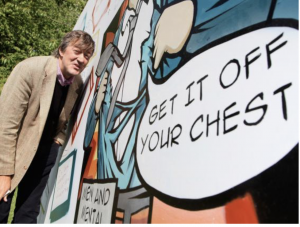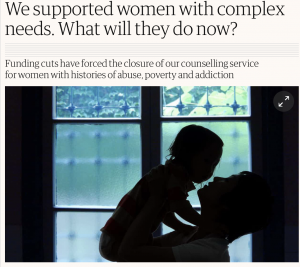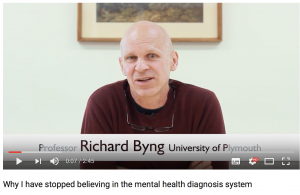
For Mental Health Awareness Week 2018 ANM explores stress, and its relationship to a bubbling political crisis.
The Mental Health Foundation published their study into stress this week. A massive 74% of 4,619 respondents said that in the past year they have felt “so stressed that they have been overwhelmed or unable to cope”.
And stress kills,
Ok, we’ve got it, there’s a stress crisis, especially in young people. Last year the independent asked “How has society managed to produce a generation of teenagers in which mental-health problems are so prevalent?“
Good question. Do you remember that quote about doctors being as if downstream on a river dealing with all the casualties flowing by but not being able to get further up the river to see who was pushing them in?
That’s what statistics about stress bring to mind this Mental Health Awareness Week 2018.
This isn’t about denying the importance of mental health, or of understanding stress and the potential negative effects of it.
It’s just that as a parent (or any other person) it’s hard not to observe that you’d have to be either extremely shielded, or very unaware as a young person not to feel anxious seeing older generations screwing it up, wrecking the planet, funding the bombing of children in other countries, normalising food-banks in their own, the UN judging their country as having broken international treaties on the treatment of its citizens, seeing their country ripped out of Europe because the old fogeys who are gonna die soon said so, while they themselves were denied a vote.
So is it really any more of a stress crisis than it is a political one? Aren’t perfectly normal reactions to unbearable stressors being pathologised? Why on earth would anyone do that?
 Lisa Dando said in the Guardian that “Public rhetoric on mental health is not being reflected on the frontline in women’s services”
Lisa Dando said in the Guardian that “Public rhetoric on mental health is not being reflected on the frontline in women’s services”
Surely, says Dando, “mental health services are about saving lives, not money.”
That’s a cosy thought, but disturbingly, evidence shows that it’s not even just about saving money, but also about extorting it!
What a massively lucrative industry mental wellness is turning out to be.
The system is self-perpetuating because once you’ve doctored the political crisis to look like a spontaneous outburst of bad mental health, especially of the young, then those gate-keeping liberals (relatable state agents who’ve created that baloney for you), get to cash in on providing solutions.
That’s right, the very same people who pathologiese perfectly ordinary and reasonable rage and disbelief at vicious social policies, can FIX IT! Yay.
I’d say that would precipitate a very lucrative mental health crisis, and one which will proliferate as people are put under more pressure.
Enter several Pre-loved Kilos of Zen Buddhism repurposed and served up as Mindfulness by modern psychiatrists and mental health academics.
At far reach from London, but well satellited by Londoners, Plymouth University seems just the sort of place where any corruption, bullying and fakery could well have national ramifications.
There was the chief exec embezzlement fiasco, in 2017.
There was also the fake degrees fiasco,
And one of their research professors, Richard Byng is an upcoming player in the national field of mental wellness, influencing policy as well as being featured as an expert academic and a GP.
 Richard Byng is particularly intrigued by the boundaries between doctor and patient. In 2017, he started making YouTube videos for the Economic and Social Research Council, under the banner of the Destress Project. He claims to want to explore the interface between “an increasing emphasis on guidelines, where we’re supposed to do things in the way we’re supposed to do them, and yet also in the context of individuals who live lives when they have such complicated, difficult lives to live in”. (bold added – Ed)
Richard Byng is particularly intrigued by the boundaries between doctor and patient. In 2017, he started making YouTube videos for the Economic and Social Research Council, under the banner of the Destress Project. He claims to want to explore the interface between “an increasing emphasis on guidelines, where we’re supposed to do things in the way we’re supposed to do them, and yet also in the context of individuals who live lives when they have such complicated, difficult lives to live in”. (bold added – Ed)
Yes it’s a meaningless non-sentence, but just think of the money.
What has this seemingly anodyne interest in the interface between a GP and their patients got to do with reducing stress? By being less informal? Does this indicate a move towards more genuine equality and reciprocity in the relationship? Maybe he just wants to chat informally on the phone, but with all his knowledge and experience. Hmmm
Don’t those formal relationships, and the guidelines around them, exist to some extent to protect service users from abuse?
On researching for Mental Health Awareness Week 2018 I found a blog online by Dr Sally Baker, she was interviewed for a job at Exeter and had this to say after the “awful encounter”:
“I decided to do a bit of research on Nicky Britten and Richard Byng. They seem to be raking in some very big research grants for projects based on foregrounding ‘service users experience’ – well they had a service user sat in front of them for 45 mins that morning and they were rude, aggressive and dishonest.”
Oh dear, not a very good start: that looks more like causing stress than fixing it.
In our series on stress for Mental Health Awareness Week 2018, we’ll take a closer look at the touchy feely interface of modern mindfulness psychiatry, and see how the evidence for a stress crisis stacks up against the obvious duty of power-holders not to deliberately cause stress to citizens in the first place.
*Figures from 2012 – no money for updating perhaps?
brexit, Guardian, Independent, Mental Health Awareness Week 2018, Mental Health Foundation, Plymouth University
At last someone who speaks the truth!
I was thinking about the history of mental illnesses and the psychiatric industry. 200 years ago there was no mental illness but then they started to pass laws making it legal to imprison indefinitely the mentally ill without them committing any crime. Strange?
What else has happened children abused by people in positions of trust started to be believed, now people accept members of the clergy can and have abused children. ANYONE can abuse anyone even people in the most trusted of industries.
I’ve also been thinking about the people used to start killing large sections of the German population in 1930s they would of had to desensitise the nurses and medics first!
I’m concerned with the victims that result from this. They end up rejected by society if they try to speak about what’s happened or what’s still happening to them they get the reply of “everyone’s got problems you know!” or “it’s not a competition to see who’s had it worst” or “you’ve got to be more positive” sometimes the victim gets to say 1% of what’s going on before these closing down statements happen. The victim is pushed further and further out of society. They may leave their home area in the hope of somewhere where they won’t be confronted with anger from the society who has pushed them out. They may find a kind service who gives them accommodation so they aren’t visible in the shop doorway. This is accomadation it’s putting the person out of sight and out of mind. At every turn the victim is blamed for the actions of others. The victim stops trusting others who are in any sort of position of power over them. In any situation someone has to ask for help from someone else the asker is in a less powerful position than the asked.
The victim gets used to anger from others and is repeatedly asked to impossible things, more anger if the victim actually manages to do these!
Mental illness is created and deepens with every angry, disbelief they encounter. Not trusting becomes necessary to survive. The victim is them blamed for this and expected to trust each new person slowly they realise they can’t. They stop asking for help as they fall further into the crack in the system society has pushed them into.
They are blamed repeatedly with anger as no one ends up homeless unless they’ve done something themselves to cause it.
Those who try to expose this have the intensive version that many have had since birth.
I never thought this would happen to me!
There’s a lot of money in accommodating people.